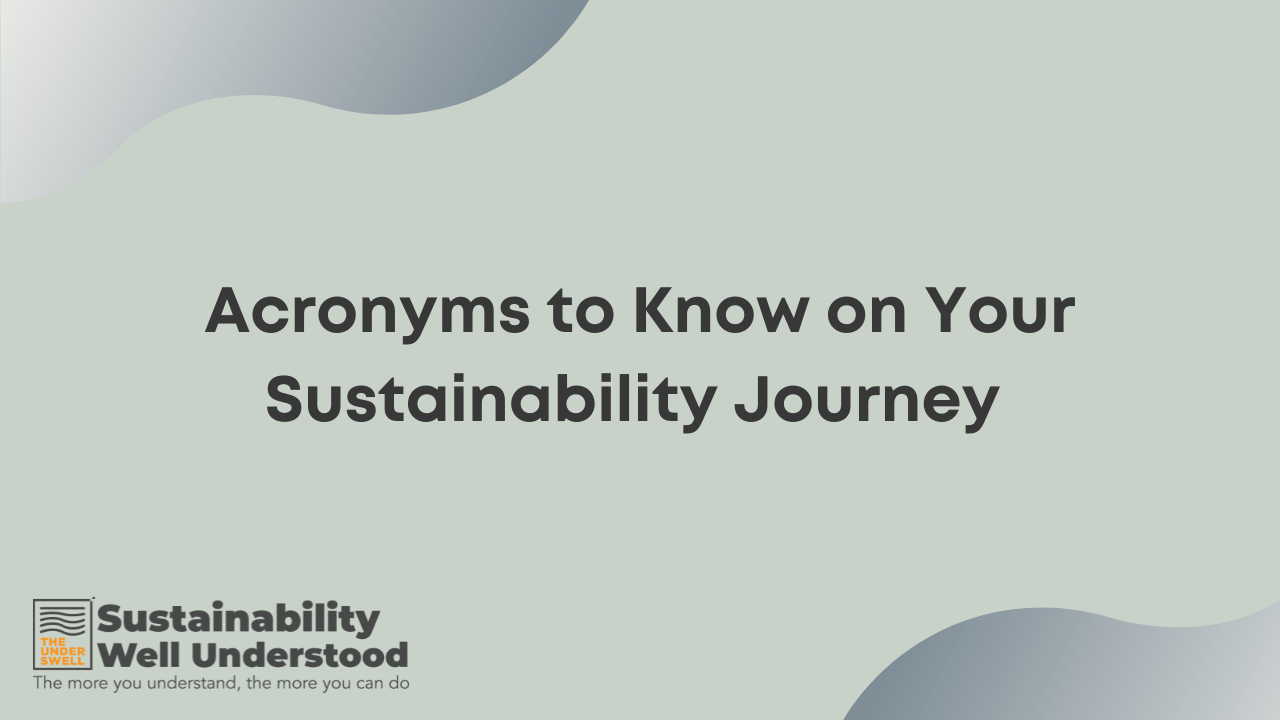Build Your Sustainability Vocabulary: Acronyms
Apr 19, 2023
The sustainable textile industry is well-known for a multitude of acronyms, but all those letters can get pretty confusing. ESG or EHS? GRI or GRS? It can all be overwhelming, but we’re here to help break down some of the most common acronyms you’ll see in the sustainability space.
Let’s start with the heart of sustainable fashion - materials-related acronyms:
OCS - Organic Content Standard
If you’re looking for organic materials, this is one of the standards you want to be on the lookout for. Developed by Textile Exchange, OCS helps clarify what measures need to be taken in order to achieve organic certification and why we should be investing more in organic fibers.
SVHC - Substances of Very High Concern
We often don’t think of the chemicals used in the production process as a material, but chemicals are in nearly every phase of production of our favorite pieces of clothing. That recycled polyester in your jeans? Yep, it has chemicals in it. The dye used to color your favorite top? Likely made from a combination of chemicals. Your favorite waterproof jacket? Chemicals help it perform at its best. That being said, we need to be aware of what chemicals are being used in our products. SVHCs are chemicals that are known to have severe effects on human and environmental health, but remember, not all SVHCs are regulated!
GRS - Global Recycled Standard
Another Textile Exchange standard, GRS is designed to verify the amount of recycled material being used in the textile industry; whether synthetic materials, metals, natural fibers, or otherwise. To achieve the GRS seal, goods must have at least 50% recycled content and social and environmental requirements associated with processing and chemicals usage. Without a standard like this, we can’t verify that the product really does contain recycled materials.
There are more materials-related acronyms we could cover, but let’s switch gears and focus on some of the business-related acronyms:
ESG - Environmental, Social, Governance
ESG is sort of like aliens in the sustainability space - everyone has a different opinion about what it looks like and no one is really sure if it even exists. In theory, ESG refers to the three areas business should focus on. Environmental impacts, social impacts, and responsible governance or leadership.
EPR - Extended Producer Responsibility
Extended Producer Responsibility refers to the responsibility a company has for their product once the consumer is done with it. For example, in the past when a consumer was done with a piece of clothing, their only option was to donate it or throw it out - EPR changes that and places the responsibility on the brand to handle their product’s end of life. This could be repair mechanisms, take-back schemes, downcycling, or, eventually, textile recycling.
MSI - Multi-Stakeholder Initiative
In an ideal world, all stakeholders would be able to work together to solve society’s problems. On a smaller scale, the MSI approach helps businesses collaborate with consumers, governments, and other stakeholders to address our most pressing concerns. It should be noted that MSI can also be used to refer to the Material Sustainability Index by Higg, a tool used to measure the environmental impact of different materials in the garment industry.
Now that we’ve covered materials-related acronyms and business-related acronyms, let’s wrap it all up with some general sustainability acronyms that can be applied to any industry
SDGs - Sustainable Development Goals
The SDGs are often referred to as a universal framework for sustainability. With 17 goals and 169 targets, the SDGs are designed to address both social and environmental impacts by 2030 with collaborative help from NGOs, governments, businesses, and citizens. Each SDG comes with its own set of targets and tools to help stakeholders reach the goal and many companies have started integrating some goals into their sustainability strategies!
IPCC - Intergovernmental Panel on Climate Change
You’ve probably heard this one a lot if you’re active in the climate action space or if you’ve heard some of the news relating to climate change. The IPCC is responsible for conducting research on climate science to better help the world understand the effects of climate change. Recently, they filed a report as a final warning to drastically cut greenhouse gas emissions with a number of climate risks listed if we don’t reach our goal of 1.5 degrees.
GRI - Global Reporting Initiative
The Global Reporting Initiative is an international organization helping businesses understand and communicate their social and environmental impacts. GRI is primarily used by companies to communicate sustainability reports, with the main benefit being fostering transparency between the business and stakeholders. Reporting on our impacts is one of the most important early steps we can take in our sustainability strategy!
While there are countless other sustainability-related acronyms we could talk about, we hope this is a helpful tool to introduce you to some of the most commonly used ones in the garment industry. If you have any questions about these or other acronyms, shoot us an email at [email protected].
See you next week!
McKenzie
